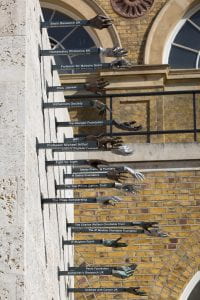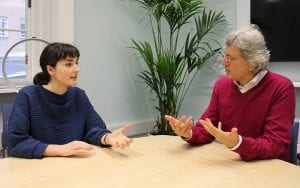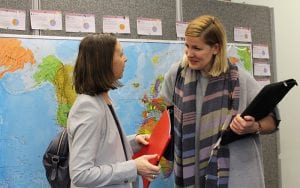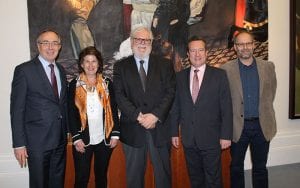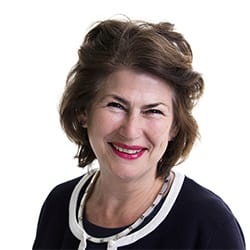
Dr Dame Nicola Brewer, Vice-Provost International
By the time you read this it may be clearer (it could hardly be less clear) whether the UK is going to leave the EU on 29 March, on 22 or 23 May [i], on 30 June or possibly at some other date after European Parliament elections. As I write, it isn’t. So, a good time for some longer term thinking about how global engagement can strengthen UCL’s academic mission and impact.
I predict that in 15 years’ time, there will be around 15 to 20 world-class universities that are distinctive in being both institutionally and academically very outward looking and internationally engaged. Some of those 15-20 will want to make a global impact for good. UCL could well be one of them. If we are, it will be because we’ve built real partnerships of equivalence around the world that make it easier for new research collaborations to be co-funded, for joint appointments to be made, for student exchanges to expand, for more foreign students from a wider range of countries to want to apply to study with us, and for more co-publications which attract high citations. That would be good for our academic mission, for individual academics and for UCL’s global impact and profile.
This is unlikely to happen by chance, without sustained effort and some institutional support. Strategic global impact, built bottom up, requires long term engagement. If we can identify patterns of individual UCL academics collaborating with particular HEIs overseas, then by building some strategic support around those collaborations – for example, student exchange agreements, joint seed funding schemes, dual degrees, visible support from the Presidents of the institutions – we can increase the chances of the partnership lasting and expanding to include more people and have more impact. If a partnership is entirely dependent on only one person in each university partner, the institutional link is likely to end when their careers take them elsewhere.

Prof Marie Lall, Prof Monica Lakhanpaul and Prof Priti Parikh, the academics working on a cross-disciplinary project to improve child nutrition in India
How much does this matter? It’s particularly important to have strongly committed international partners in difficult times. In the short term, even UCL’s brilliant minds may face challenges taking the lead in European research groups. And equally, working in a university that is comfortably in the top 20 worldwide gets all of us a warmer welcome from other leading universities than if we were relying only on individual reputations. One example: over two years of academic-led (thank you Professor Marie Lall and Professor Monica Lakhanpaul, and many others) incremental increase in our engagement with India led to an outstandingly warm and constructive welcome from the academic community at the All India Institute of Medical Sciences when the Provost and 10 academic colleagues from UCL visited last month. Not once did we have to explain that ‘we aren’t from UCLA’.
What’s the point of global partnerships?
Our Global Engagement Strategy is to work with partners to achieve fair solutions to global challenges. This involves developing strategic partnerships with international partners with global reputations, with whom UCL shares interests and expertise in solving world issues. So the partnership is not an end in itself: it is an additional means to support our academic mission.
Those strategic partnerships are being, and will continue to be, built from the ‘bottom up’, through existing academic collaboration. Alongside six ‘Type 3’ cross-institutional partnerships (the University of Hong Kong, the Max Planck Society, Osaka University, Université PSL, the University of Toronto and Yale University), we announced Peking University as our first ‘anchor partner,’ last year.
The University of Toronto is likely to become our next anchor partner, thanks to strong Faculty engagement in areas including child health, brain sciences, cities and education; plus strong commitment at a senior level, a successful joint funding scheme and a number of reciprocal visits – the next by the Provost in early April.
And we have a pipeline of 17 Faculty-led partnerships with the potential to become cross-institutional partners involving more Faculties.
Cities partnerships Programme

The Cities partnerships Programme has launched in Rome and Paris
Initial doubts from some colleagues about a new initiative as part of the Global Engagement Strategy, designed to counteract the Brexit effect, called the Cities partnerships Programme, turned to enthusiasm after some changes before the programme began. Encouraging numbers of UCL staff applied for small grants to support academic collaborations in Rome over the next three years. The first 30 projects, all being curated by Dr Florian Mussgnug (SELCS) as Academic Director, have been allocated funding and more will follow. The next cycle of projects will be in Paris, led by Dr Claire Colomb from the Bartlett. I am confident that UCL’s profile and impact in both cities will rise as a result, especially in France which Collette Lux’s Communications and Marketing team have identified as one of three priority markets to increase brand awareness of UCL.
The Cities partnerships Programme offers seed funding over the three years it will run in each city. Every Faculty is receiving funding and projects will be led by senior academics and early career colleagues. Applications for the next round of funding have just opened so if you’re looking for support for a project designed with partners in Rome or Paris, please do apply.
A small set of strategic partnerships and the Cities partnerships Programme are just two of the priority activities to deliver UCL’s Global Engagement Strategy 2015-2020 launched four years ago after wide consultation, and shortly to be reviewed to see if we should change or extend it for a further five years.
We’ll be doing this review over the next 18 months. We gave it a ‘soft launch’ at the Leadership Forum on 5 March, and collected 64 responses to questions about what colleagues do and don’t like about the current Global Engagement Strategy. We’re still analysing the results but one early finding is that there is particularly strong support for how the Strategy promotes UCL internationally.
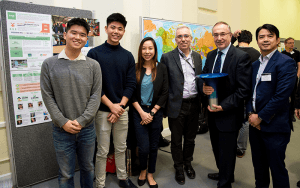
The student entrepreneurs behind Rice Inc, a social enterprise aiming to alleviate food poverty in Southeast Asia, which won the 2018 $1m Hult prize
We celebrated some of that international promotion last month. Over 160 academic and professional services staff joined the annual ‘Celebrating Global Engagement Event’ on 7 February. Students who had achieved notable international success in 2018 also came, including the winners of the 2018 $1 million Hult Prize. Many of the recent Global Engagement Funds recipients were there to share their success stories of how small amounts of UCL seed funding can help shape the direction of research and secure additional external funding.
In total so far, we’ve awarded £760,000 of grants to UCL academics who have gone on to generate £13.4 million of external funding – evidence that UCL seed-funds accelerate or catalyse the process of discovery and knowledge sharing.
Over the past three years, those Global Engagement Funds have supported 550 UCL academics to partner with over 460 organisations in 79 countries. Small grants of up to £2,000 from the fund are encouraging even more visits, journal co-publications and workshops. Applications for the latest round have just opened.
Institution-wide support and staff changes
All this global engagement activity relies on internal as well as external partnership, between academics and professional services colleagues across UCL. Implementing the Global Engagement Strategy is an institution-wide effort.
We have just appointed, or in some cases reappointed, new Regional Pro Vice Provosts and some new Vice Deans International have been appointed by Faculties. Professor Alejandro Madrigal stepped down as Regional Pro Vice Provost for Latin America but will now act as Country Ambassador for Mexico, as Professor Shin-Ichi Ohnuma does for Japan. Dr Karen Edge returned full time to the IOE at the end of February and Professor Dame Hazel Genn (former Dean of the Faculty of Laws) will take up the post of Pro Vice Provost International in April. She will be succeeded in 2020 by Professor Deenan Pillay, currently seconded from UCL as Director of the Africa Health Research Institute based in South Africa.
Staying globally engaged – and a new discovery in Qatar
A lot has changed since we developed the Global Engagement Strategy through consultation in 2014. Despite the examples of impact we can start to show the Global Engagement Strategy is having, there‘s no denying that we are in a much tougher geopolitical context than five years ago. UCL can’t change the global political realities, at least, not in the short term! But I believe that staying globally engaged and creating respectful partnerships of equivalence must be part of the answer. UCL needs to champion and support global citizens in our community and through our partnerships.
I’d like to share a recent example of how UCL is putting its knowledge and expertise to work in the field. In a monumental discovery earlier this month, a team led by Dr Jose Carvajal Lopez of UCL Qatar uncovered Qatar’s earliest Islamic period settlement.

The team of researchers, led by Dr José Carvajal López of UCL Qatar, at the spot where they unearthed the earliest Islamic period site in Qatar
As Dr Lopez said: “While this truly remarkable heritage belongs to the history of Qatar and of the Gulf, its significance goes beyond that of national and regional interests, because it can potentially change our perception of the early history of Muslims.”
That’s just one aspect of the academic excellence of UCL Qatar staff and students. To help illustrate this and to support their work, including the successful completion of UCL’s contract in Doha at the end of 2020, we have put together an infographic of their key achievements since 2010.
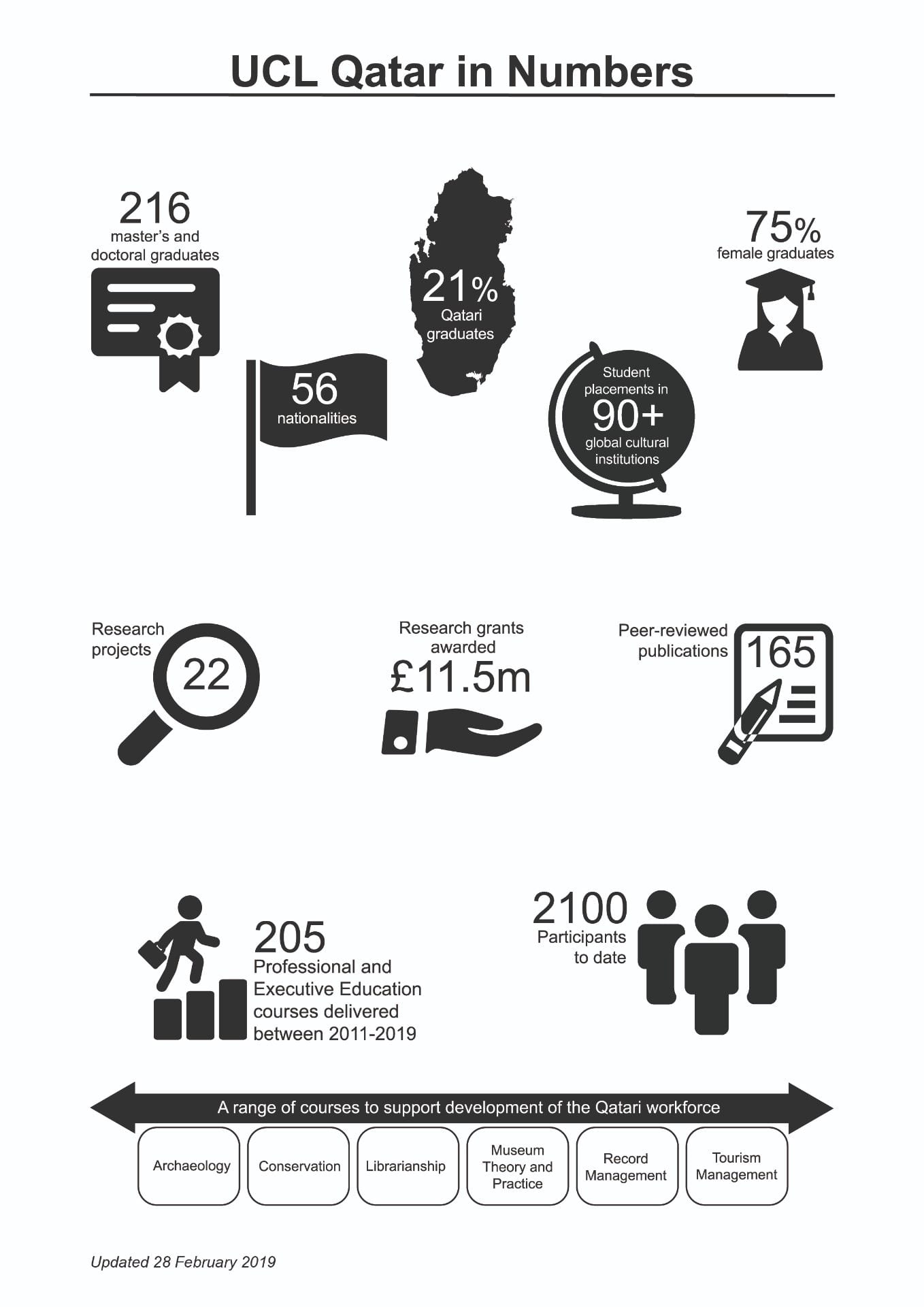
UCL Qatar in numbers
These are just some of the ways that UCL is having impact around the world. Please sign up to UCL Global News for many more examples. UCL’s academic mission starts at home but we want to make a difference globally. By 2034, I predict we’ll be one of those 15 or 20 leading universities that are widely recognised for doing exactly that.
[i] Following a request by Prime Minister Theresa May, the European Council (Article 50) agreed on Thursday 21 March to extend the UK’s departure date to 22 May 2019, provided the Withdrawal Agreement is approved by the House of Commons by 29 March 2019 at the latest. If the Withdrawal Agreement is not approved by the House of Commons by then, the European Council has agreed to an extension until 12 April 2019.
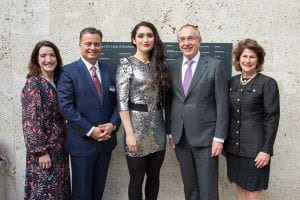

 Close
Close



